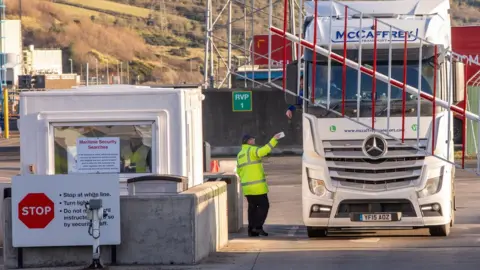NI Protocol lawfulness challenge to be heard at appeal court
 Getty Images
Getty ImagesThe Appeal Court in Belfast will hear a challenge to the lawfulness of the Northern Ireland Protocol in October.
In June the High Court in Belfast ruled the protocol was lawful.
A group of unionist politicians, including Arlene Foster and Lord Trimble, had challenged the protocol in judicial review proceedings.
They claimed it was unlawful because it conflicted with the 1998 Good Friday Agreement and the Acts of Union.
Mr Justice Colton rejected their challenge on all grounds.
He found the Withdrawal Agreement Act, which includes the protocol, did conflict with the 1800 Acts of Union in respect of free trade between Britain and Northern Ireland.
However, he added the relevant parts of the Acts of Union were "impliedly repealed" by the Withdrawal Agreement Act.
That means the more recent legislation automatically overrides the older laws.
He said the Acts of Union could not be used to override the "clear specific will of Parliament".
Normally, a constitutional law, like the Acts of Union, can only be expressly repealed but they can be impliedly by another constitutional law.
The judge said the Withdrawal Agreement Act meets the definition of a constitutional law.
This area of law is likely to be a major feature of the appeal.
The case is due to be heard by the Lord Justices of Appeal on 11 and 12 October.
They are Lord Justice Treacy, Lord Justice McCloskey and Lord Justice Maguire.
The protocol is part of the UK government's Brexit deal with the European Union.
It keeps Northern Ireland aligned with the EU's single market for goods to ensure free trade across the Irish border.
However, it has led to additional checks on goods being traded across the Irish Sea, which has drawn criticism and protests from unionists.
Not all the checks have been implemented due to what are known as grace periods.
